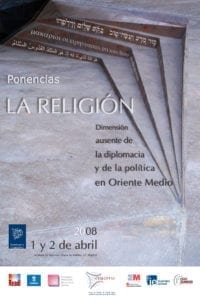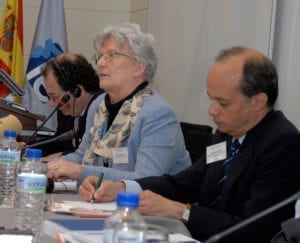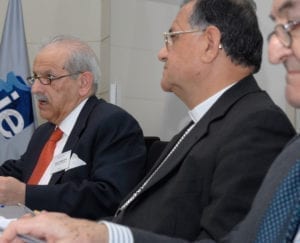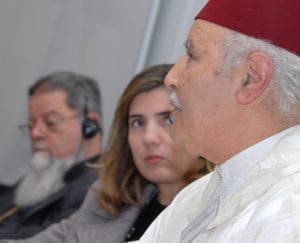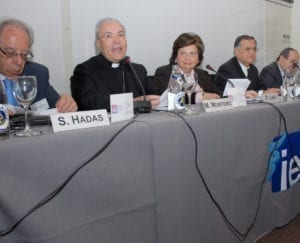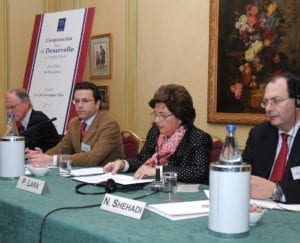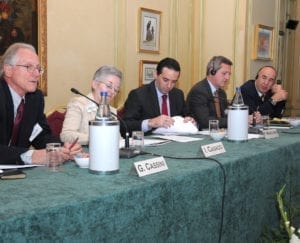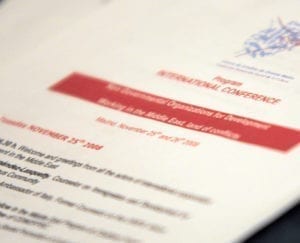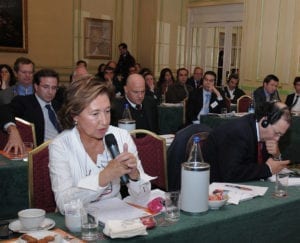Raising awareness in Madrid public opinion on the human rights situation of minorities in the Middle East
During these three annuities (2007-2010) there have been various activities (3 seminars, 10 workshops, publication of articles and interviews in the media, edition of a notebook for each seminar, current analysis posted on the web) under a focus on the promotion of human rights and the defence of individual freedoms.
The purpose has been to contribute to the awareness of the population of Madrid on gender and human rights.
In the FIRST YEAR of the program, four workshops and a seminar were organized with the presence of 109 people in total.
The first workshop took place on November 28, 2007 and dealt with the theme “Rights and Commitments on Education and Sustainable Development in the Middle East”. It was attended by 19 people, most of them representatives of Spanish development organizations and various Arab countries. A total of 41 organizations from the north and south of the Mediterranean received information and conclusions from this workshop. The organizations present were committed to collaborate in the elaboration of a Declaration on Sustainable Development that the FPSC was preparing for submission to the Economic and Social Council of the United Nations, by virtue of its general consultative status with this international body. This Statement was presented in New York on April 4, 2008, with contributions from the organizations present at the workshop.
The second workshop was held on January 11, 2008, under the heading “Conflict and Human Rights in the Middle East”, analyzed the needs detected in the Middle East and the work that the FPSC currently carries out in the area in line with the shortcomings and difficulties existing in the region. The workshop was led by Mrs. Begoña Casas with a focus on cooperative work as well as analysis and research, so it had a theoretical and a practical side, or rather a theoretical dimension aimed at the practice. It was atended by 17 people.
The seminar entitled “Religion, an absent dimension of diplomacy and politics in the Middle East,” took place on 2-3 April 2008. The religious dimension present in the conflict and the role played by moderate religious leaders in finding ways of pacification, inherent in the nature of their creed, for permanent conflicts like the Palestinian-Israeli, reason why it was considered important to incorporate the religion to the political and diplomatic processes. The seminar was articulated in three panels: 1. What is the message of peace transmitted by monotheistic religions? 2. Religion: identity of peoples, use as a resource mobilization, role in the struggle against religious totalitarianism; 3. Diplomacy and politics and the role of religion in reconciliation among peoples; It ended with an open discussion for speakers and participants.
There were Spanish and foreign speakers, of renowned prestige, and Spanish assistants of different professional backgrounds: diplomats, politicians, university professors, researchers, journalists, think tanks, etc. A total of 57 people attended.
The third workshop was held on April 21, 2008. Joumana Trad, attached to the Arab House Tribune and member of CEMOFPSC, spoke on the situation of one of the most ignored minorities in the Middle East: the Christian community.
The fourth workshop took place on May 19, 2008. Begoña Casas, responsible for the Middle East projects of the FPSC, presented the region’s problems from a historical perspective, analyzing the different political, social and economic components that are combined. 16 people attended these two workshops.
In the SECOND YEAR of the program there have been 4 workshops and a seminar with the presence of 195 people in total.
The seminar was held on 25 and 26 November 2008 under the title “Cooperation for Development and Non-Governmental Organizations, Working in the Middle East, a Conflict Zone.” It was attended by 20 institutions and NGOs from the Middle East – specifically Egypt, Lebanon and Palestinian Territories – and also from Spain. During these two days, the various aspects that define international cooperation were reflected in a specific area, namely the Middle East. The speakers represented the most varied spectrum in the field of cooperation – from donor country and donor institutions to local NGOs, to audit firms and experts who have designed cooperation strategies aimed at solving specific obstacles to development – such as Chatham House professor and expert, London, Nadim Shehadi, who designed a comprehensive report for action strategies with Palestinian refugee camps in Lebanon.
At the end of the event were read the conclusions of these two days of reflection and joint effort to improve the work of all actors involved in the chain of development in the Middle East. Subsequently, an exhaustive publication was drawn up in which the main reflections developed during the seminar were gathered and concrete guidelines for action and issues for reflection were established.
The event was attended by 43 people, all of them representatives of various development organizations and public and private institutions, Spanish and from other European countries, but mainly from the Middle East region.
The first workshop was held on May 12, 2008 in Madrid, during the Course of Higher International Studies. The speaker was Jumana Trad, member of the Executive Committee of CEMOFPSC and head of Tribune and seminars of Casa Árabe. 36 students attend the workshop.
The second workshop was held on May 19, 2008 in Madrid. The session was conducted by Begoña Casas (coordinator of the Development and Co-development Area of the Ministry of Immigration and Cooperation of the Community of Madrid) and focused on the prospects of the Israeli-Palestinian situation in the coming decades in the light of the current events. The workshop was attended by 15 people.
The third workshop was held on 20 February 2009. Middle East academic expert George Irani led the session entitled “Middle East: Quo vadis Pax”. The workshop took place in Madrid and was attended by 78 people, all young professionals from different disciplines: law, economics, media, social sciences, etc.
The fourth workshop was held on March 23, 2009. Ms. Macarena Cotelo, FPSC project director and READI president, spoke on the theme that gave the session the name: “Women, development and human rights in the Middle East “. The presentation of the theme was done by power point.
The workshop is attended by 23 people, whose list, together with the presentation that was presented, is attached in attached documentation.
In the THIRD YEAR, three workshops and a seminar were held with a total of 151 people present.
The seminar was held on November 25, 2009 under the title: “Cooperation for Development and Non-Governmental Organizations. Work in the Middle East, conflict zone. “Women and Human Rights”. 78 people attend the seminar. In addition, these conclusions were posted on the website and presented as a statement to the United Nations Economic and Social Council at the substantive session of 2010 in New York from 28 June to 22 July 2010. The statement had the title: “Gender equality and environmental sustainability in the program for the development of the Middle East.” This statement was translated into several languages.
The first workshop was held on February 26, 2010, during a breakfast discussion organized by the EPIC in which Mrs. Macarena and Mrs. Jumana Trad, members of the Executive Committee of the CEMOFPSC, spoke. The event was entitled “How to cooperate in a conflict environment?”. The event was atended by 50 people.
The second workshop was held in March 2010 on the basis of a document prepared by Félix Sánchez, a CEMOFPSC researcher, which analyzed the fundamental right to religious freedom in the Islamic tradition and, specifically, in the Middle East . This was a small working workshop for some of the expert members of the CEMOFPSC and other institutions, 13 experts participated. The document produced, as a result of a fruitful exchange and a deeper analysis carried out by the President of the CEMOFPSC, Ms. Pilar Lara, gave rise to the third workshop with a very elaborate document that was posted on the website and was presented in different forums.
- Religion, an absent dimension of diplomacy and politics in the Middle East
- Religion, an absent dimension of diplomacy and politics in the Middle East
- Religion, an absent dimension of diplomacy and politics in the Middle East
- Religion, an absent dimension of diplomacy and politics in the Middle East
- Religion, an absent dimension of diplomacy and politics in the Middle East
- Cooperation for Development and Non-Governmental Organizations. Work in the Middle East, conflict zone
- Cooperation for Development and Non-Governmental Organizations. Work in the Middle East, conflict zone
- Cooperation for Development and Non-Governmental Organizations. Work in the Middle East, conflict zone
- Cooperation for Development and Non-Governmental Organizations. Work in the Middle East, conflict zone


